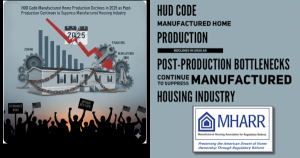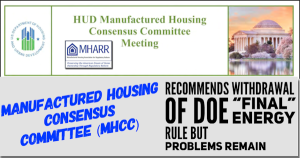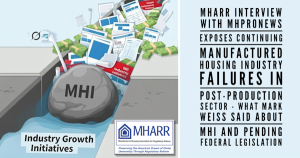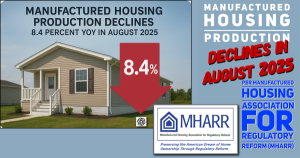MHARR White Paper Exposes Public Relations Exploitation Notwithstanding Continuing Industry Failures
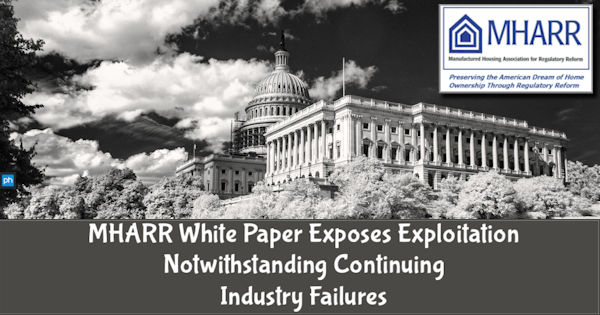
Washington, D.C., July 25, 2022 – The Manufactured Housing Association for Regulatory Reform (MHARR) has published a research White Paper (copy attached –attachment 1– attachment 2) which exposes a decades-long pattern of public relations exploitation — by the supposed representative of “all segments” of the manufactured housing industry — of laws and government benefit programs which purportedly include federally-regulated manufactured housing but, in fact, fail to achieve or deliver results on the ground for either the industry or consumers.
For many years and at an increasing pace, the erstwhile “national” representative of “all segments of the manufactured housing industry” has touted the supposed inclusion of manufactured housing within various housing, housing finance and community assistance programs of the federal government as an alleged benefit for the industry and consumers, and supposed testament to its reach and prowess.
As the MHARR White Paper indicates, however, that alleged inclusion – as well as the “benefits” supposedly flowing from such inclusion – are largely illusory, for both the industry and the lower and moderate-income American consumers who rely on high-quality, affordable and energy-efficient manufactured housing. Simultaneously, this disconnect is one of the main reasons that industry production is mired near the 100,000 homes per year level, despite unprecedented nationwide demand for affordable housing.
The reason for this disconnect, as the White Paper illustrates, is that even though Congress has generously provided – through multiple laws — for the equitable inclusion of manufactured housing in such benefit programs, that inclusion rarely, if ever, translates into the realization of corresponding benefits on the ground due, principally, to the same factors that inhibit and restrict the utilization of HUD Code manufactured housing more broadly – i.e., exclusionary and discriminatory zoning and the absence of meaningful, market-significant support for manufactured housing consumer loans by Fannie Mae, Freddie Mac, the Federal Housing Administration (FHA) and the Government National Mortgage Association (GNMA). Consequently, while benefits through such programs are nominally “available” to manufactured housing consumers, their scope and impact is undermined by the same policy failures that constrain and limit the industry more broadly.
The White Paper thus concludes that rather than seeking to take advantage of (and exploit for public relations purposes) the nominal inclusion of HUD Code homes in federal housing and housing assistance programs – with little or no matching benefit(s) on the ground — the industry should instead be focused on taking specific, aggressive and positive action in order to promote, advance and ensure the full and effective implementation of such programs – on the ground – so that the honorable and legitimate intentions of their supporters in Congress are fulfilled, rather than subverted by discriminatory policies and outright defiance.
In Washington, D.C., MHARR President and CEO, Mark Weiss, stated: “If an organization is going to take credit for representing all segments of the industry, it should be held accountable for the job that it does in relation to all segments of the industry, and whether its words are consistent with and properly representative of its actions. Legitimate accomplishments merit praise, but there is – and should be – no place for empty posturing, seeking credit for alleged accomplishments that achieve nothing concrete or even worse, convey a false pretense of accomplishment while doing nothing of substance to advance either the industry or its consumers. Therefore, rather than continuing to accept empty posturing, the industry should demand proper and legitimate accountability and measurable progress for the industry in living up to its full potential.” Weiss concluded, “The MHARR must-read White Paper sets the direction as to how the industry’s post-production sector can — and indeed, must — fully and properly implement these outstanding laws and programs that congress has generously provided for consumers of affordable housing and the manufactured housing industry”
The Manufactured Housing Association for Regulatory Reform is a Washington, D.C.-based national trade association representing the views and interests of independent producers of federally-regulated manufactured housing.
Manufactured Housing Association for Regulatory Reform (MHARR)
1331 Pennsylvania Ave N.W., Suite 512
Washington D.C. 20004
Phone: 202/783-4087
Fax: 202/783-4075
Email: MHARR@MHARRPUBLICATIONS.COM
Website: manufacturedhousingassociation.org


Washington, D.C., July 25, 2022 – The Manufactured Housing Association for Regulatory Reform (MHARR) has published a research White Paper (copy attached –attachment 1– attachment 2) which exposes a decades-long pattern of public relations exploitation — by the supposed representative of “all segments” of the manufactured housing industry — of laws and government benefit programs which purportedly include federally-regulated manufactured housing but, in fact, fail to achieve or deliver results on the ground for either the industry or consumers.
For many years and at an increasing pace, the erstwhile “national” representative of “all segments of the manufactured housing industry” has touted the supposed inclusion of manufactured housing within various housing, housing finance and community assistance programs of the federal government as an alleged benefit for the industry and consumers, and supposed testament to its reach and prowess.
As the MHARR White Paper indicates, however, that alleged inclusion – as well as the “benefits” supposedly flowing from such inclusion – are largely illusory, for both the industry and the lower and moderate-income American consumers who rely on high-quality, affordable and energy-efficient manufactured housing. Simultaneously, this disconnect is one of the main reasons that industry production is mired near the 100,000 homes per year level, despite unprecedented nationwide demand for affordable housing.
The reason for this disconnect, as the White Paper illustrates, is that even though Congress has generously provided – through multiple laws — for the equitable inclusion of manufactured housing in such benefit programs, that inclusion rarely, if ever, translates into the realization of corresponding benefits on the ground due, principally, to the same factors that inhibit and restrict the utilization of HUD Code manufactured housing more broadly – i.e., exclusionary and discriminatory zoning and the absence of meaningful, market-significant support for manufactured housing consumer loans by Fannie Mae, Freddie Mac, the Federal Housing Administration (FHA) and the Government National Mortgage Association (GNMA). Consequently, while benefits through such programs are nominally “available” to manufactured housing consumers, their scope and impact is undermined by the same policy failures that constrain and limit the industry more broadly.
The White Paper thus concludes that rather than seeking to take advantage of (and exploit for public relations purposes) the nominal inclusion of HUD Code homes in federal housing and housing assistance programs – with little or no matching benefit(s) on the ground — the industry should instead be focused on taking specific, aggressive and positive action in order to promote, advance and ensure the full and effective implementation of such programs – on the ground – so that the honorable and legitimate intentions of their supporters in Congress are fulfilled, rather than subverted by discriminatory policies and outright defiance.
In Washington, D.C., MHARR President and CEO, Mark Weiss, stated: “If an organization is going to take credit for representing all segments of the industry, it should be held accountable for the job that it does in relation to all segments of the industry, and whether its words are consistent with and properly representative of its actions. Legitimate accomplishments merit praise, but there is – and should be – no place for empty posturing, seeking credit for alleged accomplishments that achieve nothing concrete or even worse, convey a false pretense of accomplishment while doing nothing of substance to advance either the industry or its consumers. Therefore, rather than continuing to accept empty posturing, the industry should demand proper and legitimate accountability and measurable progress for the industry in living up to its full potential.” Weiss concluded, “The MHARR must-read White Paper sets the direction as to how the industry’s post-production sector can — and indeed, must — fully and properly implement these outstanding laws and programs that congress has generously provided for consumers of affordable housing and the manufactured housing industry”
The Manufactured Housing Association for Regulatory Reform is a Washington, D.C.-based national trade association representing the views and interests of independent producers of federally-regulated manufactured housing.
Manufactured Housing Association for Regulatory Reform (MHARR)
1331 Pennsylvania Ave N.W., Suite 512
Washington D.C. 20004
Phone: 202/783-4087
Fax: 202/783-4075
Email: MHARR@MHARRPUBLICATIONS.COM
Website: manufacturedhousingassociation.org



